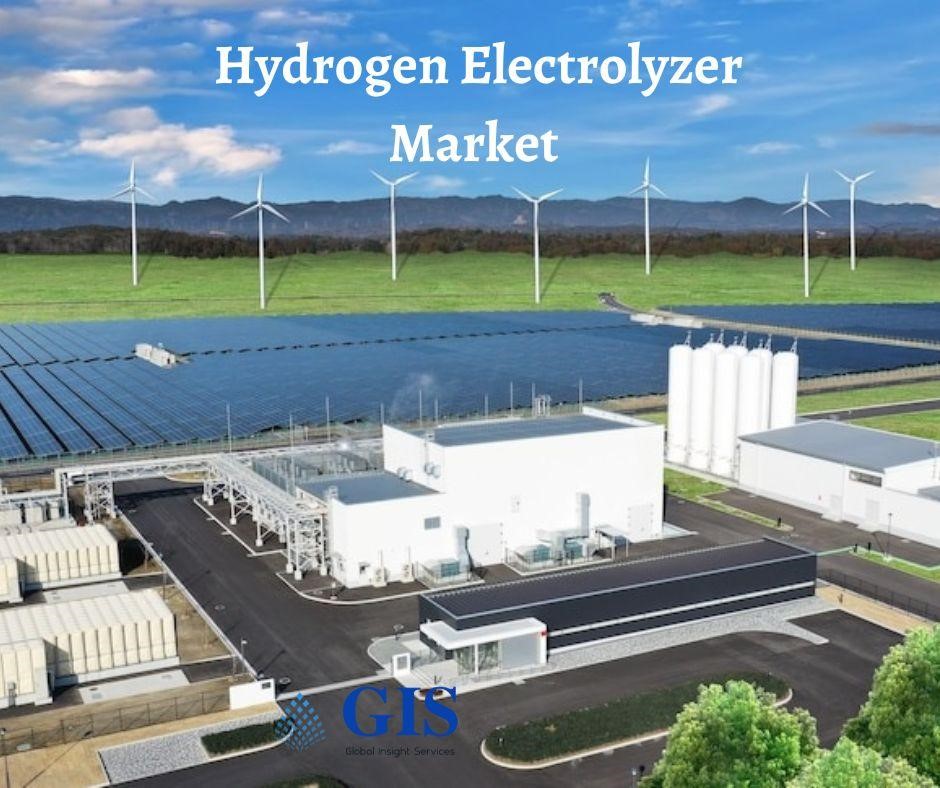Business
Hydrogen Electrolyzer Industry – Growth & Trend Analysis

Introduction
The world is moving towards sustainable energy and electrolyzers play a crucial role in this transition. Electrolyzers are devices that use electricity to split water into hydrogen and oxygen. The hydrogen produced can be used as a clean fuel in various industries, including transportation, power generation, and chemical production. The global electrolyzer market is expected to grow significantly in the coming years, and this article aims to provide a comprehensive guide on electrolyzers.
Types of Electrolyzers
There are mainly two types of electrolyzers: alkaline electrolyzers and proton exchange membrane (PEM) electrolyzers.
Alkaline Electrolyzers: These are the oldest and most mature technology used for water electrolysis. They use an alkaline solution (typically potassium hydroxide) as the electrolyte and operate at temperatures between 50-70°C. They are reliable, efficient, and have a long lifespan of up to 40 years.
PEM Electrolyzers: These are a newer technology that uses a solid polymer membrane as the electrolyte. They operate at lower temperatures of around 80°C and require pure water as the feedstock. They are more efficient than alkaline electrolyzers and have a faster response time, making them suitable for intermittent renewable energy sources such as solar and wind.
Request Sample Pages of this Research Report
Applications of Electrolyzers
Hydrogen produced from electrolyzers can be used in various industries, including:
- Transportation: Hydrogen fuel cell vehicles are gaining popularity as a clean alternative to traditional gasoline and diesel vehicles. Hydrogen fuel cell vehicles have a longer range than electric vehicles and can be refueled in minutes.
- Power Generation: Hydrogen can be used to generate electricity in fuel cells. Fuel cells are more efficient than traditional combustion engines and have lower emissions.
- Chemical Production: Hydrogen is used as a feedstock in the production of chemicals such as ammonia, methanol, and other industrial gases.
Market Trends
The global electrolyzer market is expected to grow significantly in the coming years due to the increasing demand for clean energy. According to a report by Global Insight Services, the global electrolyzer market is projected to grow from USD 0.5 billion in 2021 to USD 8.7 billion by 2031, at a CAGR of 31.1%.
The Asia-Pacific region is expected to dominate the market due to the increasing demand for hydrogen in the transportation sector and the growing emphasis on reducing carbon emissions. Europe is also expected to have a significant market share due to the EU’s hydrogen strategy, which aims to increase the production and use of hydrogen in various industries.
Hydrogen Electrolyzer Market Restraints & Challenges
The key restraints and challenges in Hydrogen Electrolyzer market are as follows:
- High cost of electrolyzers: The high cost of electrolyzers is one of the key restraints in the hydrogen electrolyzer market. The cost of electrolyzers can range from $500/kW to $3,000/kW, depending on the type and size of the electrolyzer.
- Lack of infrastructure: The lack of infrastructure is another key challenge in the hydrogen electrolyzer market. There is a lack of hydrogen refueling stations and pipelines, which makes it difficult to transport hydrogen.
- Limited storage capacity: The limited storage capacity of hydrogen is another challenge in the hydrogen electrolyzer market. Hydrogen can only be stored in pressurized tanks or pipelines, which limits its storage capacity.
- Fluctuating demand: The demand for hydrogen is highly fluctuating, which makes it difficult to maintain a stable supply. The demand for hydrogen depends on the availability of renewable energy, which can fluctuate due to weather conditions.
Recent Developments
- In November 2022, Bloom Energy Corporation recently launched its high volume commercial electrolyzer line at its Newark plant, boosting the company’s electrolyzer producing capacity to two gigatonnes. Bloom may best fulfil market demands by simplifying existing production for larger volume electrolyzer output.
- In August 2022, Nel has decided to build a new fully automated production line at Herøya in Norway, doubling its capacity for production of alkaline electrolyzer stacks to ~1 GW. The growing demand for green hydrogen needs more electrolyzers and in order to match the supply Nel has increasing its production sites.
- In June 2022, Plug Power Inc. planned to construct a 35-tonne-per-day green hydrogen producing facility at the Port of Antwerp-Bruges in central Europe. Plug signed a 30-year concession agreement to construct the facility at Belgium’s second-largest port in Europe. Plug intends to build a 100-megawatt green hydrogen plant on 28 acres of land leased under the agreement, using its own electrolyzer and liquefaction technology. Plug will generate up to 12,500 tonnes of liquid and gaseous green hydrogen per year for the European market.
- In March 2022, Siemens Energy brought the hub of its hydrogen technology to Berlin by locating the industrial manufacturing of electrolysis modules there. Production is expected to begin in 2023 at the Huttenstrasse site in the Moabit neighborhood of Berlin.
- In March 2022, Greenko ZeroC (GZC), and John Cockerill, have signed an exclusive Framework Agreement to develop market initiatives for green hydrogen electrolyzers in India. GZC and John Cockerill will pool their resources to work together on all aspects of the market evolution for green hydrogen electrolyzers, which transform clean energy into carbon-free hydrogen.
Conclusion
Electrolyzers play a crucial role in the transition towards sustainable energy. They are used to produce clean hydrogen that can be used in various industries, including transportation, power generation, and chemical production. There are mainly two types of electrolyzers: alkaline electrolyzers and PEM electrolyzers. The global electrolyzer market is expected to grow significantly in the coming years due to the increasing demand for clean energy. As the world moves towards a cleaner and sustainable future, electrolyzers will play a vital role in the energy mix.
-

 Digital Marketing4 days ago
Digital Marketing4 days agoExploring the New Updates in Instagram for 2025
-

 Science4 days ago
Science4 days agoThe Ultimate Quantum Physics for Beginners Book: Your First Step into the Quantum Realm
-

 Food4 days ago
Food4 days agoYour Essential 7-Day Meal Plan to Lose Belly Fat for Lasting Results
-

 Food4 days ago
Food4 days agoSavoring Health: Delicious Mediterranean Diet Recipes for Every Meal
-

 Automotive4 days ago
Automotive4 days agoBreaking Down the Latest Tesla News: What You Need to Know Today
-

 Education4 days ago
Education4 days agoUnpacking the Future: Key Educational Technology Trends for 2025 and Beyond
-

 Food6 days ago
Food6 days agoHow to Lose Weight Fast: The Best Drink Recipes for Rapid Results
-

 Entertainment3 days ago
Entertainment3 days agoMastering Twitch Clips: Your Ultimate Guide to Sharing Epic Moments


















